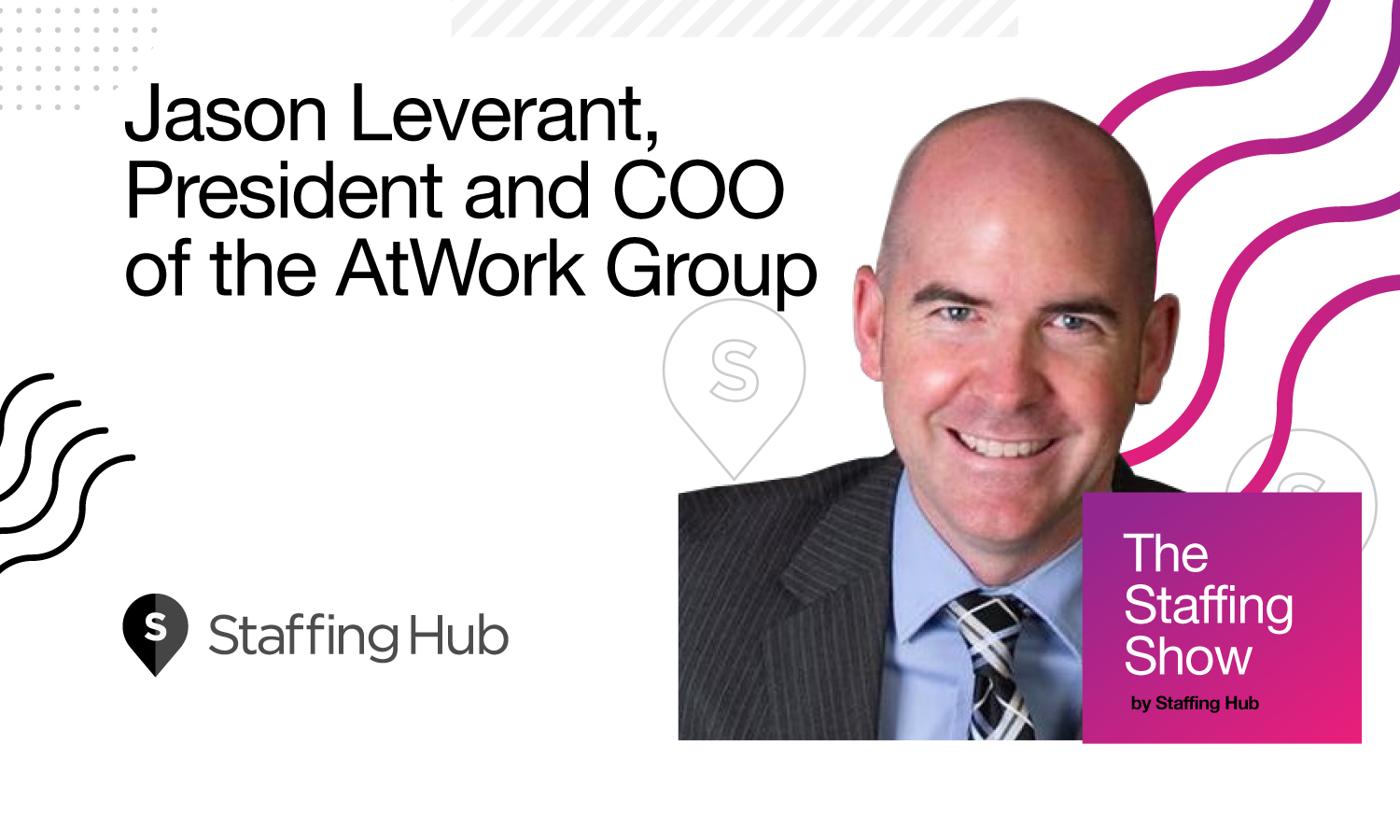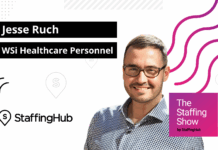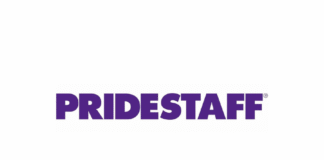
In this episode, I talk to Jason Leverant, president and COO of the AtWork Group. Here, Leverant shares the secret to AtWork’s consistent double-digit growth, their insane focus on service, and the next big trend in recruiting communication (is it carrier pigeons???).
StaffingHub: Congratulations on making the Inc. 5000 for the fifth year in a row! That’s very exciting. I was wondering if you could talk a little bit about what drives AtWork’s consistent, impressive growth.
Leverant: Yes, that’s awesome that people are taking note of the growth. It’s something that I feel is really a direct result of certain actions that we’ve taken, and certain philosophies that we operate and live by as an organization.
Just a quick history lesson with AtWork, I took the helm from a leadership perspective in 2012 and at that point in time we were really focused on trying to grow the company, trying to grow our presence in the U.S.
AtWork is little bit of a different animal. We’re a franchised-based staffing organization, but by the same token, I come from staffing industry. The team that I’ve assembled are staffing professionals. And, so we really are taking a focus our day-to-day operations, how we’re going to market, those differentiators, and things of the sort.
But, going back to 2012, what really helped to, I feel, lay the foundation for this really phenomenal growth that we’ve experienced, was looking at our mission, what was driving the company, and what was driving our actions on a daily basis.
At that point in time, you could’ve ripped our mission statement out of any generic mission template statement. It wasn’t anything sexy or exciting or cool. It wasn’t memorable by any means.
We wanted something that people could really grab on to, and understand, and make sense of. As we were looking at that, we looked at various aspects. We had this tagline that AtWork always utilized that we had actually trademarked, this idea to be at work for you. And so that really stuck with us, this whole idea to be at work for you, because as a staffing firm, and as a franchise, we’re service-based. We’re service-focused.
So, if we’re truly living by this, I’m at work for you, I’m at work for our clients. I’m at work for our talent. That service-first mindset, it really drives exactly what we’re trying to accomplish.
So, that’s what we did. We adopted this idea, “at work for you” as our mission statement, very simple, very basic, but it’s memorable, people understand it, people know it.
I guarantee you ask anybody on our team what’s our mission, they know what it is.
And that’s our focus. It really speaks to what we do.
There’s some color behind. We have core values that underpin that mission statement.
It may sound hokey, but it’s all about service. That focus on service has really helped my team, has helped our franchise, and the management team in the field focus on service. It helps us truly perform at a higher level.
So, when it gets to when we look at our net promoter scores, and we look at those results from our clients and from our temporary associates, we’re performing at really world-class levels. Not just for the staffing industry, but when it compares to other organizations, other world-class companies, our NPS scores are really off-the-charts. When you couple a driving force, this focus on service, we really live by that mission, obviously proven through our net promoter score results. Everything comes together and growth happens because of that.
We really are constantly in a state of growth, not only have we been in the Inc. 5000 five years in a row, but we’ve been in the Staffing Industry Analyst’s fasting-growing staffing firms list five or more years in a row.
As we grow, and we’re pushing bigger numbers, that whole idea of law of bigger numbers comes into play. It’s a lot harder to push numbers when you’re having to grow double digits millions every year or more. And that’s exactly what we continue to do.
Staffing Hub: I’m curious how you have operationalized this service focus, or really put legs under this driving mission of being ‘at work for you.’ Can you give me a sense of how that culture operates on the ground?
Leverant: Oh definitely, definitely. As I mentioned earlier, we are a franchise-based organization, so it creates a little bit different dynamic in our organization than others. But the principle remains true, and I’ll kinda loop it back around
Each of our locations, and typically every location, but some of our franchise partners have multiple locations, but we have owners that have a vested interest in the success of their branch. They’re boots on the ground. They’re close to the actual action happening, the transaction, the matching processes.
So, when you have that actual literal ownership factor in play, hands down it’s proven and the stats show: service levels are higher, because at the end of the day it’s their reputation.
So that, coupled with this driving mission, coupled with technology, resources, tools that are industry-leading, you put everything together and it nets that positive result, growth, that high net promoter score, because you have that vested interest coupled with all these best-in-class tools and resources and processes.
The same token is if you’re in an organization that doesn’t have the benefit of having owners, stakeholders, boots-on-the-ground, in the branches, the key is to building that ownership in your teams. It’s building that same type of buy-in, that same type of passion for the company.
Those are special individuals and usually come from cultivating culture internally in that side of that. But, yeah, I feel like that’s a little bit of our special sauce, a little bit of our secret to why we keep posting year after year just double-digit, three to four times industry level growth.
Staffing Hub: And without necessarily giving away any of that secret sauce, how do you train for engendering that sort of loyalty or buy-in?
Leverant: That’s a great question as well. Again, remember, it’s not only figurative ownership in the company, it’s also literal. Again, we have a bit of a tactical advantage, because when you have somebody that actually owns, has a vested interest in the success of that branch, they’re listening a lot harder, they go that extra mile, they go those extra steps, but that’s exactly what we teach as well.
Standard operating processes in the staffing industry, they’re service-focused, taking cues for other industries that are hyper-focused on service. And that’s really our goal.
I feel many times staffing industry folks get tunnel vision and look at what’s going on in the staffing industry alone. Really, in order to be successful, we’ve gotta broaden our horizon, look what’s working in other industries, what can we pull over from the standpoint of best practices to try to create better service.
In my opinion, if you get the core components down, it’s about the little things. It’s about those little touches that make your talent happier to be a part of your organization or your network than the next guy.
It’s those little touches that help you on the client side that those clients become very loyal, and I’ll say we have clients that have been with us, as many firms do, but I feel like we have a high percentage of these that have been with us since day one, 26 years ago, who have remained with us as our client partners. Through thick and thin, because of that, the service elements, because of those little things that our owners do and our staff do that have been with us.
Again, it does help as well that because we have that vested interest locally, we have I would say a pretty phenomenal tenure with our organization as well. We have branch staff that, again, because they are closer to that ownership, boots-on-the-ground feel there, they have more buy-in, their voices are heard, and we see a retention rate that’s high as well.
So, we have a lot of positives going for us, what you can glean from that is cultivating and building an ownership with your firm and with your organization. That’s really the key. That’s really the kicker, getting buy-in on really that service focus and that service mindset.
Staffing Hub: I see a lot of staffing firms sort of fall flat by interacting in a transactional manner with their candidates, or sort of seeing candidates as almost a product.
Leverant: Yeah, they’re expendable, yeah, exactly. I would agree completely.
As the economy has shifted, and the pendulum has swung, and we’re in a talent-short market, talent is more valuable than ever before.
The funny thing is, I do consistently hear still, to this day, negative feedback from the talent end of the spectrum about their experiences in the staffing branch. “I walked into the branch, nobody greeted me, I stood around for five minutes nobody said one word. They avoided eye contact and so I just left.”
Or: “when they did speak with me they were rude. It was like I was inconveniencing their day from being there.”
In this day and age, if somebody walks into your branch, you stop what you’re doing and that’s who you focus on, because that’s really how we generate and grow and build. We don’t have billable hours with our talent to put to work.
If those billable hours are short-lived, if it’s the wrong type of talent, if it’s the wrong person for the wrong job.
Staffing Hub: And it seems like this is getting even more pressurized because of the labor shortage. So, if there’s a lack of billable hours sometimes or a lack of candidates, everyone is sort of fighting over the same talent. Because what we’re circling is the need for a more candidate-focused experience, I’m wondering, from your perspective, how do you think recruiters can be more responsive to candidates, or create a better candidate experience.
Leverant: Oh, exactly, and that’s exactly really what the mindset is. I’d hate to go back to the whole idea of the golden rule, treat others how you wanted be treated.
So put yourself in the shoes of a candidate. If you were looking for a job, and you walk into a potential employer, how do you want to be treated? How would you like to be spoken to? If I’m calling in and I’m asking questions, and I understand that there are many times when the questions can get repetitive, and your five phone lines are ringing off the hook with clients demanding talent, and whatever the case may be. But at the end of the day, if you operate in that mindset of ‘how would I wanna be spoken to,’ and honestly building processes to that effect as well and helping facilitate that scale, because that’s the challenge from the standpoint of scaling your business. You can do that on a boots-on-the-ground level, one branch, one location, but you start scaling, how do you replicate those same high-service-focused processes.
And so that’s really the key, is to think it through, take each step in the process, plan it out, map it out, set a SOP and replicate and move forward. That’s where I think people fail is they don’t have the time in their day to stop and do those things, but when they actually make the time, at the end of the day the returns are much more positive.
Staffing Hub: So, you mentioned a little bit ago that tools and technologies that are best-in-class for the industry, and I think in terms of creating those processes, choosing the right tools that allows your team to focus on the candidate experience seems crucial more than ever.
Leverant: Oh yeah, exactly, exactly. That is a challenge as well, too, because there’s a lot of technology.
There’s a lot of distractions to recruiters today of the next best thing, the next piece of recruiting technology that they can’t live without.
And there are literally hundreds and hundreds of companies that want you to buy their products and use their wares and assume that we can operate more efficiently by using their services.
It’s buyer beware, be careful with who you believe and who you partner with and take your time, do your homework and be diligent in regards to what you utilize and what’s available.
At the end of the day, many of these folks are looking for long contracts, big payouts. There’s lots of expense involved, so it’s really in what you need to recruit effectively.
If we go back in time, prior to LinkedIn, think about those days when we didn’t have such great tools to recruit, such great prospecting tools. And then track those activities, these just phenomenal CRM tools and ATS and CRM capabilities, artificial intelligence, and sourcing that could come into play. All these different pieces help us become more effective recruiters, become faster at what we really do.
At the end of the day, I still feel like, as a recruiter, having the ability to interview candidates, to really speak with them to get that good, holistic fit is critical. You can only use technology so far to get a list of candidates that would make a good match, then it’s on you to make that superior match to really show that service element.
If it could be done without a recruiter, without a strong recruiter, then our customers would probably leverage that technology as well. They’d do it without us. But that’s not the case.
Honestly, I’ve done a lot of investigation. I’ve done a lot of speaking on this subject. While AI recruitment tools are great, they still lack the ability to make those calls, that pit-of-your-stomach feeling that a recruiter gets if a candidate’s not a good fit, or there’s a red flag there, many times those tools have no idea how to detect that side of it.
Until that becomes a reality, which I’m sure may not be in my lifetime, who knows, it’s not something to worry about. The key is not burying your head in the sand. To see the tools that are able to make a positive impact, that are able to make your recruiters more efficient and be able to produce more. Those are the ones that you’re gonna wanna lean on and gravitate towards.
Staffing Hub: It’s so hard with such a vast staffing tech landscape to differentiate between the flashy piece of software and something’s that’s really going to clear space for your recruiters. What gets you excited? What tech are you paying attention to?
Leverant: So obviously anything that makes the candidate experience or any engagement with our firm, a more fluid, a more pleasurable experience, something that’s easy to use, mobile-friendly is obviously critical from the front end, from the very first engagement with the company.
And, so personally, we reworked our website completely with the candidate experience in mind because the vast majority who were actually visiting atwork.com, so we completely reworked it. We completely reworked our location pages. We’ve looked at that, again, thinking through the details, really setting a time to really understand our target audiences, to design the website with that in mind.
Through that process we really wanted to make it an easy experience to find jobs, to apply for work, and engage with our branches, and find where our branches are and put a phone call to them, and so on and so forth. Beyond that obviously, that experience through the hiring process, also has to be very slick, has to be very easy to accomplish, whether it be partnership with third party ATS and onboarding tools, which are a few really great ones. I’m not paid to advertise, so I’ll leave the names alone, but do some research and you can find some really good. There are some really good tools out there that are pretty slick.
Through that process obviously is having that white glove service touch, and having a good strong team in the branch that’s gonna hand walk and help these candidates through that process.
Tech isn’t everything.
That’s why we’ve seen the rise, and I don’t wanna say fall, I wanna use that as a negative foundation, but the rise of these online platforms where people, almost the Uber of staffing, but where they potentially lack their legs is in that human element, in that aspect of that recruiter’s with them to walk them through the process, somebody to speak with that they can engage with to really help them understand the type of jobs they’re looking for and make those strong placements. So there are tools like that as well.
Those excite me as well. I think there’s a place for them. I think there’s an opportunity for a traditional recruiter, staffing branches, to leverage that technology in their branches. I think we’re just starting to scratch the surface of it.
We see a couple of large, large firms implementing their own versions of their own kind of Uber for staffing type models that are starting to take a foothold, coupling the technology with a brick-and-mortar branch footprint or network. That excites me a bit.
AI recruitment sourcing tools I think are … they’re still a bit early, but they’re not gonna go away. They’re only gonna get better, and those tools just make recruiters lives easier. It makes them more efficient, helps them sift faster through candidates to find the right fit. As they work, they get smarter, and so the longer they’re out there, I’m looking forward to seeing them get stronger and stronger, but will they supplant, will they take away work from a recruiter, I don’t know.
The demand for our service is greater than ever before.
So, if our folks can become more efficient at it, we can become more successful, clients see the value to the need increase and therefore generate more demand for more recruiters, private recruiters, again, I don’t know, perhaps.
So, that’s really the key, is how these tools really fare in what they do, but are we gonna see in the next 10 years me instead of hiring a recruiter in my branch, licensing a recruitment sourcing tool and it becomes it own brand name and runs it’s own full desk — I don’t see that happening.
Staffing Hub: That actually dovetails into what I was just thinking about, where do you see the industry going with these sort of twin impulses toward automation and AI, and at the same time a more candidate focus that requires the human touch?
Leverant: Yeah, exactly, and so just reiterating that fact of I feel like these are what they’re described as, they’re tools, and as tools become more efficient, does the efficiency of a tool mean extinction for a certain job title. So I use this analogy.
I actually spoke on this subject at Staffing World in Chicago last year, and the analogy of a hammer and its various iterations. Think of cavemen sitting around a fire and trying to hammer something with a stone, then somebody realized they got smart and stuck a handle on it with some twine, and, wow, they can hammer twice as fast, and progressed through the hammer has developed in so many different forms or fashion.
Now, you could have the most efficient hammering device possible, and you have these pneumatic nailers, these automatic nailers and things like that, but has the demand for carpenters that actually wield those tools declined?
And, if you speak with somebody that does construction staffing, does any kind of skilled trade staffing, they would be the first to correct that there’s such a huge demand for skilled trade services right now, it’s been more so than ever before, but we’re in an age that we’ve seen greater leaps in technology than ever before as well.
If you look at it as a tool, and how can you wield that tool effectively, and how can you make it more efficient, I think what you’re gonna do is have a lot higher quality of service, a lot higher quality of placement happening from our recruiters, at perhaps a faster speed, but I think it’s gonna help in quality as well too, and finding the very best person for a role.
Staffing Hub: What’s on the horizon for your carpenters, your recruiters, what’s on the horizon for AtWork?
Leverant: We’re always looking to improve. We’re looking at different ways to leverage technology to improve. We’ve done some early data testing with some AI type sourcing tools.
I actually was speaking at the Tennessee Staffing Symposium in Nashville two months ago and talking about a local type targeting, a candidate targeting.
There’s some ways to leverage location aware devices to a different level and a greater extent than what we’ve seen in the past.
There’s one specific service that intrigues me that I’ve been engaging with for quite some time that really quite literally is based on feeding jobs to where the candidate physically is in the city and on the map. And it’s getting quite a nice traction.
So I’m curious to see how that could potentially impact our recruiting activities, especially when many of our branches are positioned in close proximity to our talent base. That’s really what we’re looking at is kinda leveraging some of that locality-aware component that I feel are relatively green, so that’s a little bit newer type approach. Location-aware devices and services have been around for a while, but we’re able to now leverage some targeting within certain parameters, which are kinda neat. Not share too much of our strategy.
Staffing Hub: Sure. That’s interesting. This is something that people never talk about, but do you think that will lead to more face-to-face recruiting or a return to more in-person connections?
Leverant: I’ve said so many times, it feels like now what’s old is new again, when the economy is so tight. We have to go back to our roots in recruiting and we can just through an ad out on Craigslist and LinkedIn, and CareerBuilder, and Monster, we have to get really local with it from the standpoint of, and, again, we’re a traditional commercial staffing, so flyers at the laundromat, flyers in the apartment complexes, almost the old-school style recruiting where we’re out in front of people.
We do job fairs, we go out throughout the community, we spend a lot of time trying to engage with the community, and build rapport in the communities, a lot of those activities are almost your old-school style recruiting, not leveraging the internet so much.
We still push a lot on Facebook, of course, but we’re out there doing these things face-to-face with people. So it’s funny that you mention that. It is that mindset now of what’s old is new again.
Staffing Hub: People don’t talk about it at all, so it’s an under-used channel: standing in front of someone.
Leverant: Agreed, and now I will have to stop myself and say the idea of fax-based recruitment, I don’t think that will ever come back. I want that one to die.
Staffing Hub: Okay, so no fax machines.
Leverant: That would be cool if we could, carrier pigeons are like falcons, you have the little messages attached to-
Staffing Hub: That would be like high-end recruiting there. Thank you so much for your insight today. This was a really insightful interview, and I enjoyed it.
Leverant: Oh yeah, Caitlin, I appreciate the opportunity to share our experience and the journey we’ve been on. It’s been a really exciting one, and I’m excited to see it continue and I think all signs are pointing to the industry continuing to post just phenomenal numbers, and lots of positive momentum. And so hopefully we’ll all be along for that great ride.







